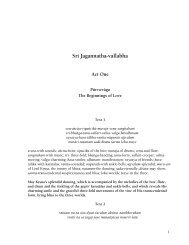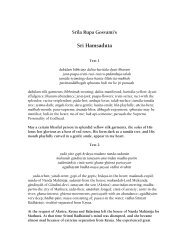Srimad Bhagavatam, Volume 3
Srimad Bhagavatam, Volume 3
Srimad Bhagavatam, Volume 3
You also want an ePaper? Increase the reach of your titles
YUMPU automatically turns print PDFs into web optimized ePapers that Google loves.
<strong>Srimad</strong> Bhagawatam, First Canto, <strong>Volume</strong> Three<br />
sometims the Himaalayan provinces (Haimavat) It is said Sukdeva Goswami<br />
was born in these Himalayan provinces and he came to Bharatvarsa after<br />
crossing the Himalayan countries.<br />
In other words Maharaj Parikshit conquered all over the world namely all the<br />
continents adjoining all the seas and oceans in all direction namely the east,<br />
west, north and southern parts of the world.<br />
Tatratatra upasrinwanah swapurvesam mahatmanam<br />
Parigiamanam cha yasah krishna mahatma suchakam.<br />
Atmanam cha paritratam aswatthamno astra tejasah<br />
Sneham cha Vrishniparthanam tesam bhaktim cha kesav.e<br />
Tebhyah parama samtustah priti ujjrimbhita lochanah<br />
Mahadhanani vasansi dadou haran mahamanah.<br />
Tatra tatra—everywhere the King visited, Upasrinwanah—continuously he<br />
heard, Swapurvesam—about his own forefathers, Mahatmanam—who were<br />
all great devotees of the Lord, Parigiamanam—unto those who were thus<br />
addressing, Cha—also, Yasah—glories, Krishna—lord Krishna, Mahatma—<br />
glorious acts Suchakam—indicating, Atmanam—his parsonal self, Cha—also,<br />
Paritratam—delivered, Aswatthamno—of Aswatthama, Astra—weapon,<br />
Tejasah—powerful rays, Sneham—affection, Cha—also, Vrishniparthanam—<br />
between the descendants of Vrishni and that of Pritha, Tesam—of all of them,<br />
Bhaktim—devotion, Cha—Also, Kesave—Unto lord Krishna, Tebhyah—unto<br />
them, Parama—extremely, Santustah—pleased, Priti—attraction,<br />
Ujjrimbhito—pleasingly open, Iochanah—one who has such eyes,<br />
Mahadhanai—valuable riches, Vasanani—clothings, Dadou—gave in charity,<br />
Haran—necklace, Mahamanah—one who has broader outlook.<br />
Wherevever the king visited, continuously he heard about the glories of<br />
his great forefathers who were all devotees of the Lord indicating herein<br />
about the glorious acts of Lord Krishna also. He also heard about his<br />
personal self as to how he was protected by the Lord from the powerful<br />
heat of the weapon of Aswatthama. The addressers also mentioned about<br />
the great affection between the descendants of Vrishni and that of Pritha<br />
on account of the latter's great devotion for the Lord Keshava. The king<br />
thus being very much pleased upon the singers of such glories had his<br />
eyes open in great satisfaction and he was pleased to award upon the<br />
singers very valuable necklaces and clothings by his magnanimous mind.<br />
Kings and the like great personalities of the state are presented with welcome<br />
addresses, is a system from time immemorial and Maharaj Parikshit, as he<br />
was one of the well known emperors of the world, was also presented with<br />
addresses of welcome every where in all parts of the world as he visited those<br />
places. The subject matter of those welcome addresses was Krishna. Krishana<br />
means Krishna and His eternal devotees as much the king means the king and<br />
his confidential associates.<br />
Krishna and His unalloyed devotees cannot be separated and therefore<br />
glorifying the devotee means glorifying the Lord and vice versa. Maharaj<br />
Parikshit would not have been too glad to hear about the glories of his<br />
forefathers like Maharaj Yudhisthir and Arjuna etc had it not been so done in<br />
connection with the acts of Lord Krishna. The Lord descends specifically for<br />
deliverance of His devotees ( paritranaya sadhunam ) and the devotees are<br />
glorified by the presence of the Lord because such devotees cannot live for a<br />
moment without the presence of the Lord by His different energies. The Lord<br />
is present fore the devotee by His acts and glories and therefore Maharaj<br />
Parikshit felt the presence of the Lord when He was glorified by His acts<br />
specially in the matter of his personal self as he was saved by the Lord in the<br />
womb of his mother. The devotees of the Lord are never in danger; but in the<br />
material world which is full of dangers in every step, the devotees are<br />
apparently placed into dangerous position and thus being saved by the Lord<br />
the Lord is glorified. Lord Krishna would not have been glorified as the<br />
speaker of the Bhagwat Geeta had his devotees like the Pandavas were not<br />
entangled in the battlefield of Kurukshetra. All such acts of the Lord were<br />
mentioned in the addresses of welcome and Maharaj Parikshit, in full<br />
satisfaction, rewarded those who presented such addresses. The difference<br />
between the presentation of welcome addresses in the modern days and that in<br />
the days gone by is that formerly the welcome add resses were presented to a<br />
penson like Maharaj Pearikshit; the welcome addresses were full of facts and<br />
figures and those who presented such addresses were sufficiently rewarded;<br />
whereas in the present days the welcome address is presented not always with<br />
factual statements but to please the postholder and sometimes they are full<br />
with untruth for flattering the object but alas rarely such presentations of<br />
welcome addresses are rewarded by the poor receiver.<br />
Sarathya parsada sevana sakhya doutya<br />
Veerasanugamanam stavanam pranaman<br />
Snigdhesu pandusu jagat pranatim cha vishno<br />
Bhaktim karoti nripatis charanarvinde.<br />
Sarathya—acceptance of the post of a chariot driver, Parsada—acceptance of<br />
presidentship in the assembly of Rajsuya sacrifice, Sevana—engaging the<br />
mind constantly in the service of the Lord, Sakhya-think of the Lord as friend,<br />
38<br />
Doutya-acceptance of the post of a messenger, Veerasana—acceptance of the<br />
post of an watchman with open sword at night, Anugamanam—following the<br />
foot prints, Stavanam—offering of prayers, Pranaman—offering obeisances,<br />
Snigdhesu—unto them who are malleable to the will of the Lord Pandusu—<br />
unto the sons of Pandu, Jagat—the universal, Pranatim—one who is obeyed,<br />
Vishno—of Vishnu, Bhaktim—devotion, Nripatis—the king Charanarvinde—<br />
unto his lotus feet.<br />
When Maharaj Parikshit heard it that Lord Krishna (Vishnu), who is<br />
universally obeyed, out of His causeless mercy upon the malleable sons of<br />
Pandu, rendered all kinds of service in the matter of acceptance of the<br />
post of a chariot driver, to that of the presidentship according to the will<br />
of the Pandavas including the messengership, friendship, watchmanship<br />
at night, obeying like a servant and offering obeisances like one younger<br />
in age etc; at that time the king Maharaj Parikshit became overwhelmed<br />
with devotion unto the lotus feet of the Lord.<br />
Lord Krishna is everything to the unalloyed devotees like the Pandavas. The<br />
Lord was for them the Supreme Lord, the spiritual master, the worshipable<br />
deity, the guide, the chariot driver, the friend, the servant, the messenger and<br />
everything as they could conceive of Him; and thus the Lord also reciprocated<br />
the feeling of the Pandavas. Maharaj Parikshit as a pure devotee of the Lord<br />
could only appreciate Lord's transcendental reciprocation of the feeling of His<br />
devotees and thus he himself also became overwhelmed with the dealings of<br />
the Lord. Simply by appreciating the dealings of the Lord with His pure<br />
devotees one can attain to salvation. The Lord's dealings with His devotees<br />
appear to be ordinary human-dealings but one who knows it in truth becomes<br />
at once elligible for going back to home back to Godhead. The Pandavas were<br />
so much malleable to the will of the Lord that they could sacrifice any amount<br />
of their energy for the service of the Lord and by such unalloyed<br />
determination only they could secure the Lord's mercy in any shape they<br />
desired.<br />
Tasya evam vartaman asya purvesam vrittim anwaham<br />
Na atidure kila ascharyam yad asit tat nibodhame.<br />
Tasya—of Maharaja Parikshit, Evam—thus, Vartamanasya—remaining in<br />
absorption of such thought, purvesam—of his forefathers, Vrittim—good<br />
engagement, Anwaham—day after day, Na—not, Atidure—far off, Kila—<br />
verily, Ascharyam—astonishing, Yad—that Tat—which, Nibodha—know it,<br />
Me—from me.<br />
While Maharaj Parikshit was passing his days hearing about the good<br />
occupations of his forefathers and he was absorbed in that thought veriy<br />
what happened not far away from him you may know it from me.<br />
Not far away from his camp what happend is now stated by Suta Goswami.<br />
Dharmah pada ekena charan vichhayam up alabhya gam<br />
Prichhati sa ashruvadanam vivatsam iva mataram.<br />
Dharma—The Personality of religious principle, Pada—leg, Ekena—by one<br />
only, Charan—wandering, Vichhaynm—overtaken by the shadow of grief,<br />
Upalabhya—having met, Gam—the cow, Prichhati—asking, Sa—with,<br />
Ashruvadanam—with tears on face, Vivatsam—one who has lost her<br />
offspring, Isa—like, Mataram—the mother.<br />
The Personality of religious principle Dharma in the form of a bull was<br />
wandering. And he met the Personality of earth in the form of a cow who<br />
appeared to be aggrieved like a mother who had lost her child and thus<br />
she looked with tears on her face. She lost the beauty of her bodily<br />
feature and thus Dharma asked the earth as follows.<br />
Bull is the emblem of moral principle and the cow is the representative of the<br />
earth. When the bull and the cow are happy in joyful mood it is to be<br />
understood that the people of the world are also happy and are in joyful mood.<br />
The reason is that the bull helps production of grains in the agricultural field<br />
and the cow delivers milk the miracle of aggregate food values. Thehuman<br />
society therefore maintains, these two important animals very carefully so that<br />
they can wander every where in cheerfulness. But at the present moment in<br />
this age of Kali both the bull and the cow are now meant for being slaughtered<br />
and eaten up as foodstuff by a class of men who do not know what is the<br />
Brahminical culture. The bull and the cow can be protected for the good of all<br />
human society simply by spreading the Brahminical culture is the topmost<br />
perfeetion of all cultural affairs because by advancement of such culture only<br />
morale of the society is properly maintained where by peace and prosperity of<br />
the society attained without any extraneous effort for them. When<br />
Brahminical culture deteriorates the picture is televisioned by the above<br />
description of the cow and bull and the resultant action is prominent by the<br />
following symptoms.<br />
Dharma uvacha:<br />
Kachchit bhadre anamayam atmanaste<br />
Vichhayasi mlayate isat mukhena<br />
Alaksaye bhavatim antaradhim<br />
Dure bandhun sochasi kamchit amba.












